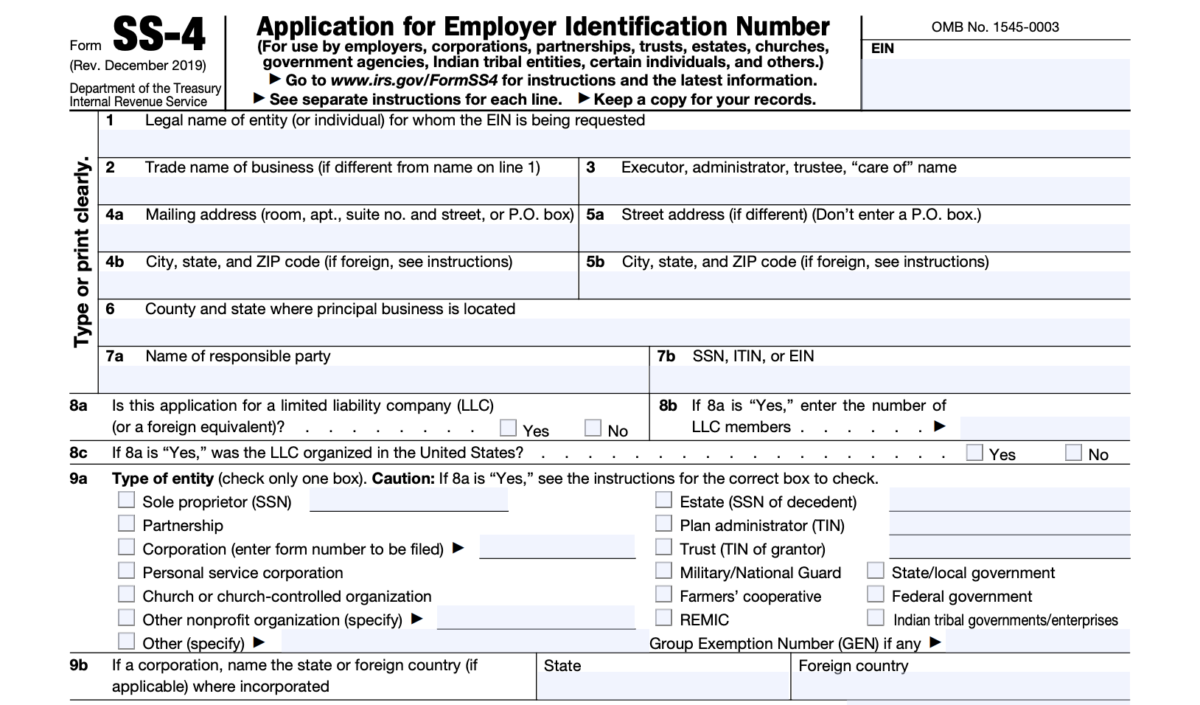The COVID-19 outbreak remains to spread across the globe at a perilous rate. It has disrupted major structures of the world, from political and religious structures to economic and financial systems. Its abrupt arrival has not only created a public health crisis but also plunged the global economy into a critical contraction. Businesses, irrespective of their sizes and industries, struggle to sustain operations or worse, decided to shut down.

The pandemic has forced people to stay home, causing companies to enforce a work-from-home setup and individuals to adopt online methods in place of the traditional ways of doing day-to-day tasks. People resort to doing transactions and buying goods online to safeguard themselves and avoid contracting the contagious virus.
As consumers resort to online shopping, online entrepreneurship is fast becoming prevalent. Even established businesses have reinvented the ways they operate, embracing online selling strategies to attract and accommodate the growing number of online consumers.
Table of Contents
The Growth of Online Entrepreneurship
An online business, also recognized as electronic business or e-business, refers to any business activity that occurs over the internet. The process of an online business includes selling and buying products online or providing online services.
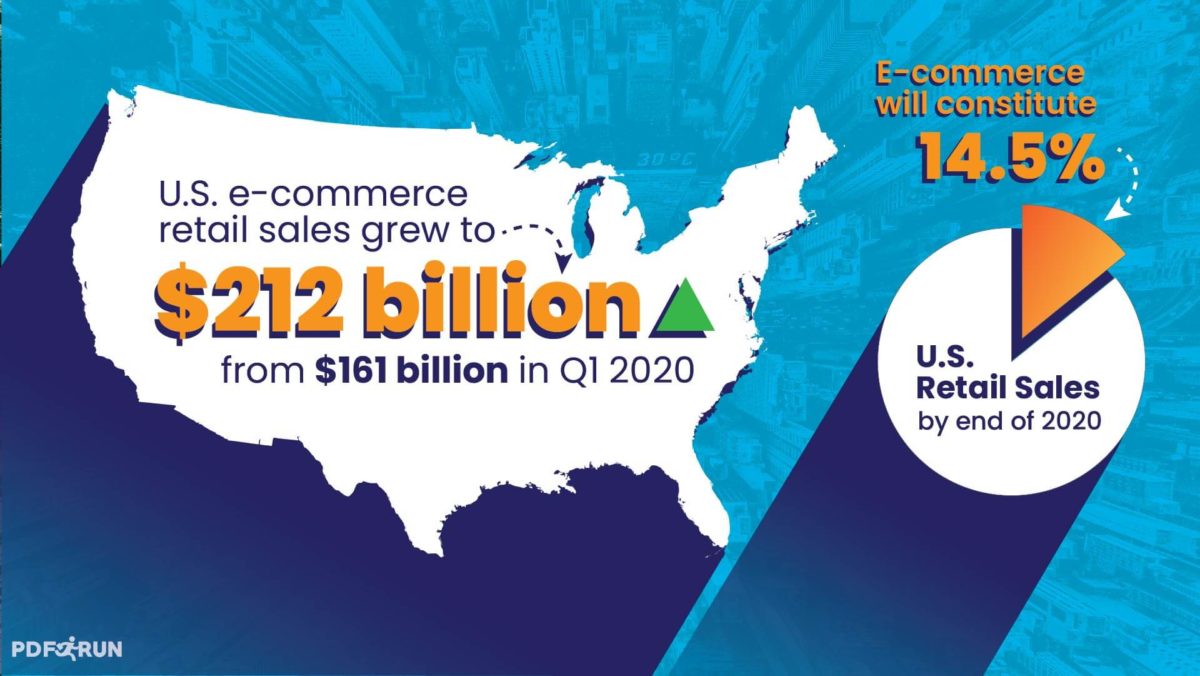
The U.S. Census Bureau of the Department of Commerce (DOC) reported that in the second quarter of 2020, the U.S. retail e-commerce sales grew to $211.51 billion from $160.41 billion in the first quarter. E-commerce is set to account for 14.5 percent of U.S. retail sales in 2020. The previous year was at 11 percent. The report confirms that online entrepreneurship proves to be profitable for individuals who aspire to put up their business amid the COVID-19 pandemic.
Online Business VS E-Commerce
Some individuals use “online business” and “e-commerce” interchangeably; however, online business is not e-commerce. E-commerce refers to buying and selling online while online business encompasses all business activities done online. E-commerce is a category under online business.
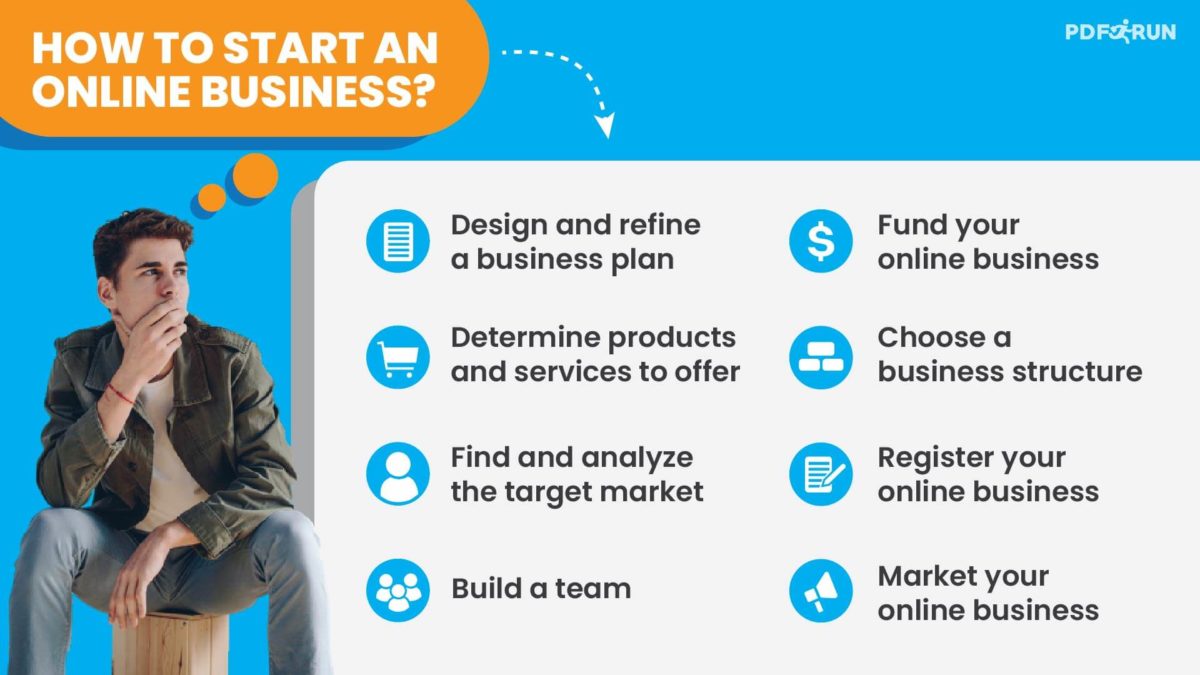
How to start an online business?
The thought of starting an online business has crossed your mind, but you are unaware of the processes associated with and required by it. Perhaps you have a business idea that you just want to fine-tune.
How do you envision your online business to be? Businesses that offer essential products seem to succeed better than those that offer novelties and trivial items, regardless of whether there is a pandemic or not. Do you want to open an online supermarket? How about an online pastry and dessert shop? The possibilities are endless.
Here are the steps to follow to start an online business:
Step 1: Design and refine a business plan
A business plan will serve as your go-to and primary document in every phase of your business, from determining the goals of your business to future expansions. In essence, it is a formal document that lets you determine the components of your would-be business, including its products and services, target market, source of funding, and financial projections.
After outlining the basic elements of your online business, you will be able to form an executive summary that provides a high-level overview of your company.
Consider these key points when creating a business plan:
-
- Regardless if you have a business plan in mind or not, you can utilize a business plan template to write or fine-tune your idea. You can also build your business plan from scratch if you prefer to.
-
- Personal evaluation is crucial in designing a business plan. You must figure out and decide if you can commit yourself to the business, assess your professional expertise, and determine if you will need support.
-
- Building a business plan entails market research and soliciting advice from people, particularly credible mentors.
Without market research, a business may fast become irrelevant and unknown. Companies conduct market research regularly to keep up with trends, maintain a competitive value, initiate new selling strategies, and identify new potential customers.
-
- Constructive criticisms from peers and mentors strengthen the integrity of a business plan. You may reach out to your inner circle, associates, bosses, and business advisors for informed opinions and solid advice to enhance your current plan. Seek advice to establish a firm foundation before you kickstart your online business.
Step 2: Determine products or services to offer
To identify accurately the products or services to offer, you need to think about the current needs and lifestyles of potential customers. Successful entrepreneurs have learned the ability to select and offer the right products and services to their customers despite being head-to-head with competitors.
There are countless products and services that you can offer; however, your ability to determine the right ones will influence the future success or failure of your online business.
Those that are relevant and in-demand several years ago might not appeal to or be useful for consumers today, especially now that we are in a state of a global health emergency.
Apart from analyzing the products and services from the perspective of customers, you must also do a self-analysis to determine if you can commit to marketing and offering them.
All in all, an effective way to assess the possibility of success or failure of products and services is to check their relevance, marketability, and demand.
Step 3: Find and analyze the target market
When you have products and services to offer, you must determine the individuals who will and can be consumers, as marketing and selling to a broad audience only result in wasted resources.
Before you start selling, you have to discover and examine your target market. Targeting a particular group of people does not mean that you would no longer cater to individuals who do not fit your guidelines. Target marketing enables entrepreneurs to zero in on people who are more likely to become customers and to come up with calculated strategies to reach them accurately. It is a tried-and-tested method to reach potential clients and to generate business efficiently and cost-effectively.
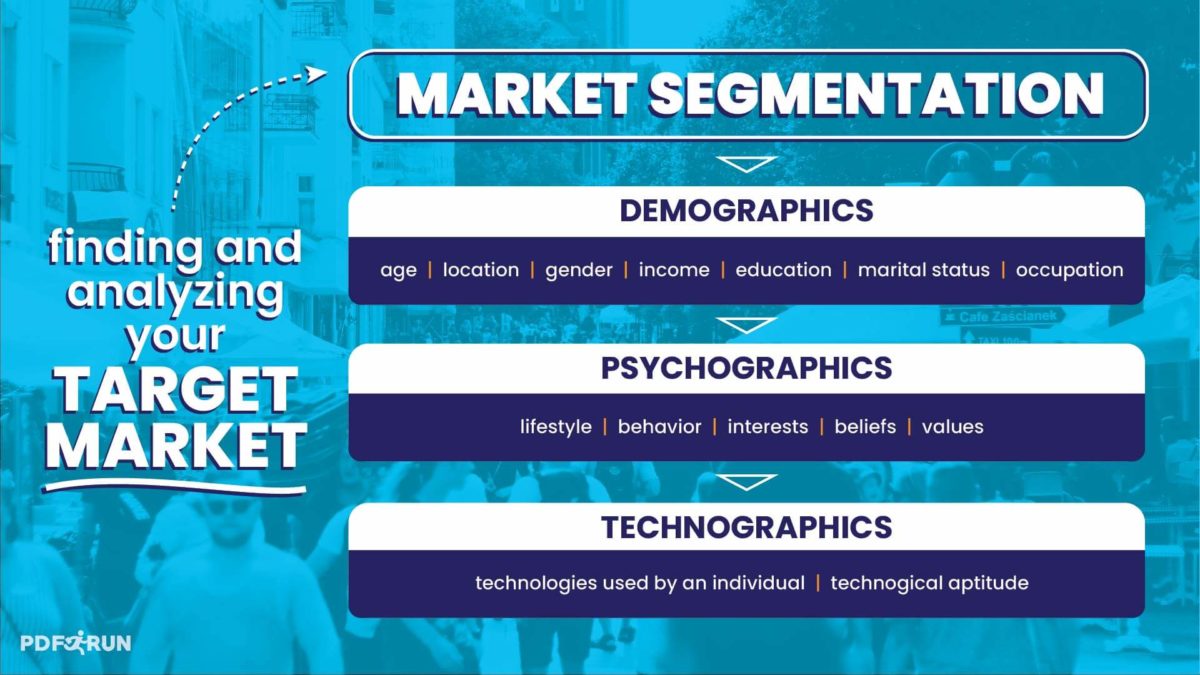
-
- Market Segmentation
Study the demographics, psychographics, and technographic of your desired target market.
-
- Demographics — Include age, location, gender, income, education, marital status, and occupation.
- Psychographics — Include lifestyle, behavior, interests, beliefs, and values.
- Technographic — The profiling of individuals based on the technologies they use, including mobile devices, applications, and software.
A foolproof way to pinpoint the right market is to decide who will benefit the most from the products and services you offer.
Step 4: Build a team
Brick-and-mortar businesses are not the only ones that need a dedicated team to succeed. Online businesses involve processes that require the supervision of skilled individuals. From inventory and pricing to marketing and after-sales service, an online business team is responsible for ensuring that all business processes are problem-free and seamless.
According to a study by CB Insights on the reasons startups fail, the third top reason is the failure to build a competent team. Thus, a team that is capable of both contributing ingenious ideas and executing strategies is advantageous.
You should build a team for the long term and not just for the initial phase or first few years of your online business. What are the long-term goals for your business? Do you want to put up a physical store in the future? Consider your long term vision for your business. Define the business culture you desire. Then, find people you need to realize that vision and to establish that culture.
Hire individuals who are capable of becoming leaders and can manage the functions that would allow your business to hit targets and to grow. Moreover, while healthy and productive arguments within a team are typical from time to time, constant friction among team members will result in division. A surefire way to set a business up to fail is to have a team that does not get along; therefore, prioritize hiring people who are humble yet competent and motivated.
Step 5: Fund your online business
Many businesses fail when they run out of money; thus, before starting an online business, you need to guarantee that you have sufficient funds to cover for costs until the business can support its expenses.
Aside from establishing financial goals, you must list down the expenses your business will have by reviewing your strategic plan. Developing financial projections enables you to anticipate operating costs and sales forecasts.
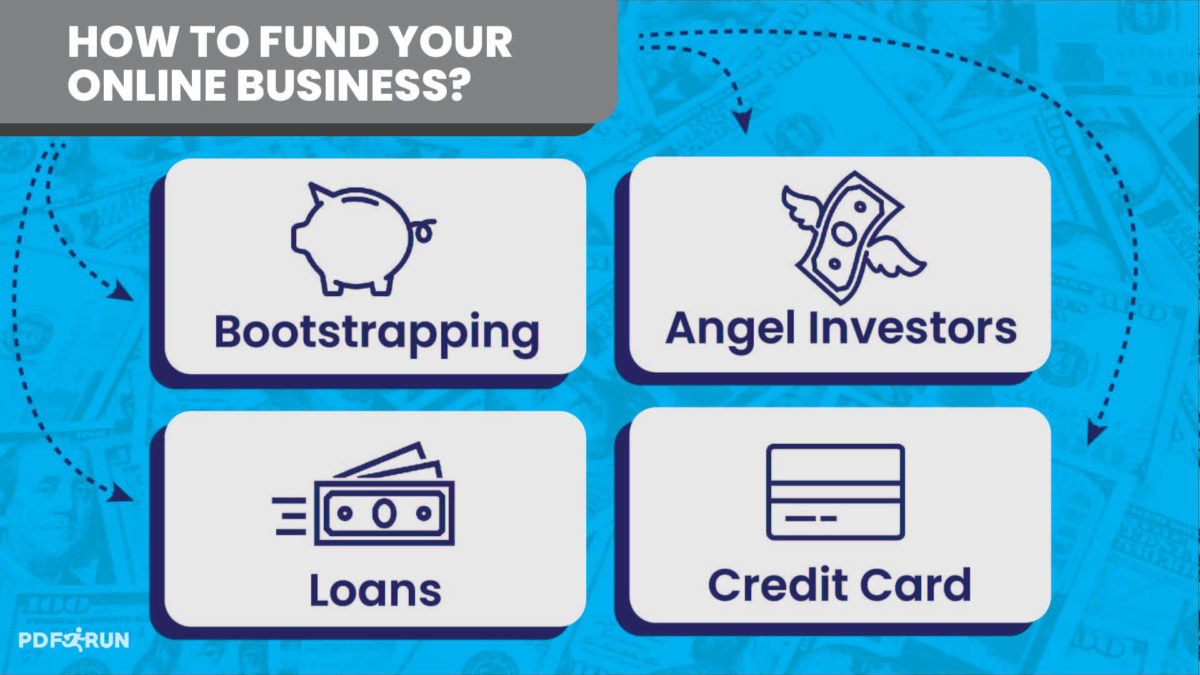
Here are effective ways to fund your online business:
- Bootstrapping
You can finance your business from the start until it has a stable and consistent profit to sustain its operations. Entrepreneurs call the method bootstrapping. Although it presents a greater financial risk, such a method offers flexibility and allows you to run your business on your terms.
- Loans
Aside from financing your online business using your money, you can also apply for a business loan. To convince a financial institution or organization to grant you a loan, you must have a rock-solid business plan, describing how you will spend the loaned money and detailing sales forecasts.
- Angel Investors
You may pitch to angel investors who can provide capital for your online business. They can be your family, friends, wealthy people such as business owners and professionals with high net worth, or investment groups. The primary downside of using angel investors is your loss of complete control over your business, as in general, their investment would be in exchange for ownership equity or convertible debt.
- Credit Card
Although inadvisable, if you have a credit card, you can use it to fund your online business. However, if you fall behind on payments, you risk falling into a debt hole, ruining your credit score in the process. You should approach using your credit card to finance your business with caution. Having a backup source of funds is wise to avoid sky-high interests and insuperable financial problems.
Step 6: Choose a business structure
Every business structure is unique and offers advantages. Each entity sets a level of personal liability, ownership, and tax obligations. Deciding on the business structure of your online business is about finding the right type that can provide it with the legal and financial protection it needs.
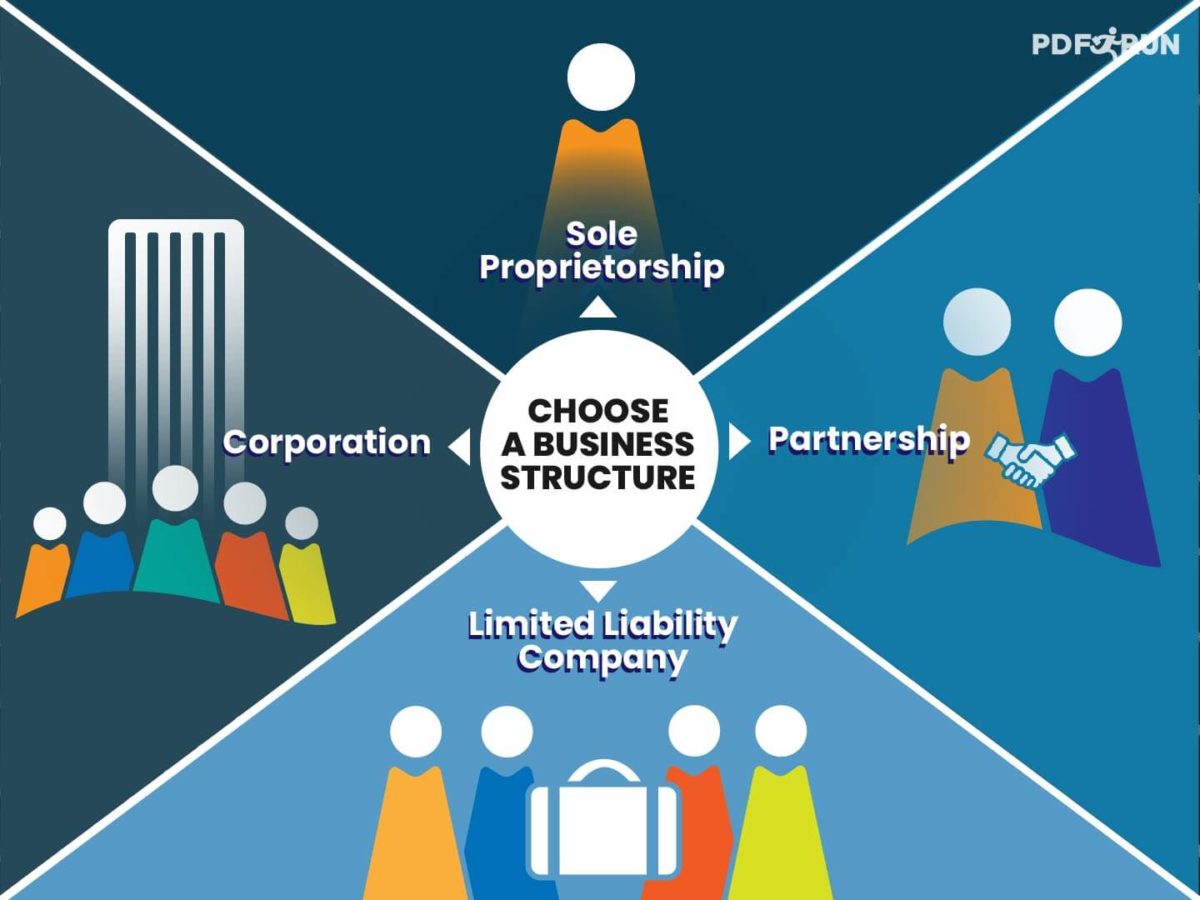
- Sole Proprietorship — This type of business structure has a single owner. To start operating legally, local permits may be necessary. On a state or federal level, you do not have to file government papers and register with the Internal Service Revenue (IRS).
Tax obligations are profit-dependent and will be according to your income bracket and self-employment tax. Sole proprietors file Form 1040 Schedule C, Profit or Loss from Business form, attaching it to their Form 1040 to report their personal tax returns.
- Partnership — According to the IRS, a business with more than one owner is considered a partnership. Every owner has unique functions and responsibilities and is equally liable for the activities of the business. However, when a partner quits, the partnership may dissolve.
Same with sole proprietorships, partnerships do not have to file government papers or register with the IRS to operate. Tax obligations are profit-dependent and require partners to file self-employment tax. Partners file Form 1065, U.S. Return of Partnership Income, with their personal tax returns.
- Limited Liability Company (LLC) — In general, the IRS treats LLCs as sole proprietorships or partnerships unless they ask to have the same tax obligations as corporations. This type of business entity enables members to separate personal and business affairs. Moreover, it enjoys the advantages of corporations with less paperwork and personal liabilities.
- Corporation — Although infrequent, there are online businesses that are corporations. Corporations have a high tax obligation. As of 2019, corporate taxes are at 21 percent. Personal taxes that owners need to pay will depend on their wages or dividend shares.
If a corporation has less than 100 shareholders, you may register it as S Corporation. It functions as a corporation, but files taxes like a partnership.
Step 7: Register your online business
After choosing a suitable business structure for your online business, you can now proceed with the registration process.
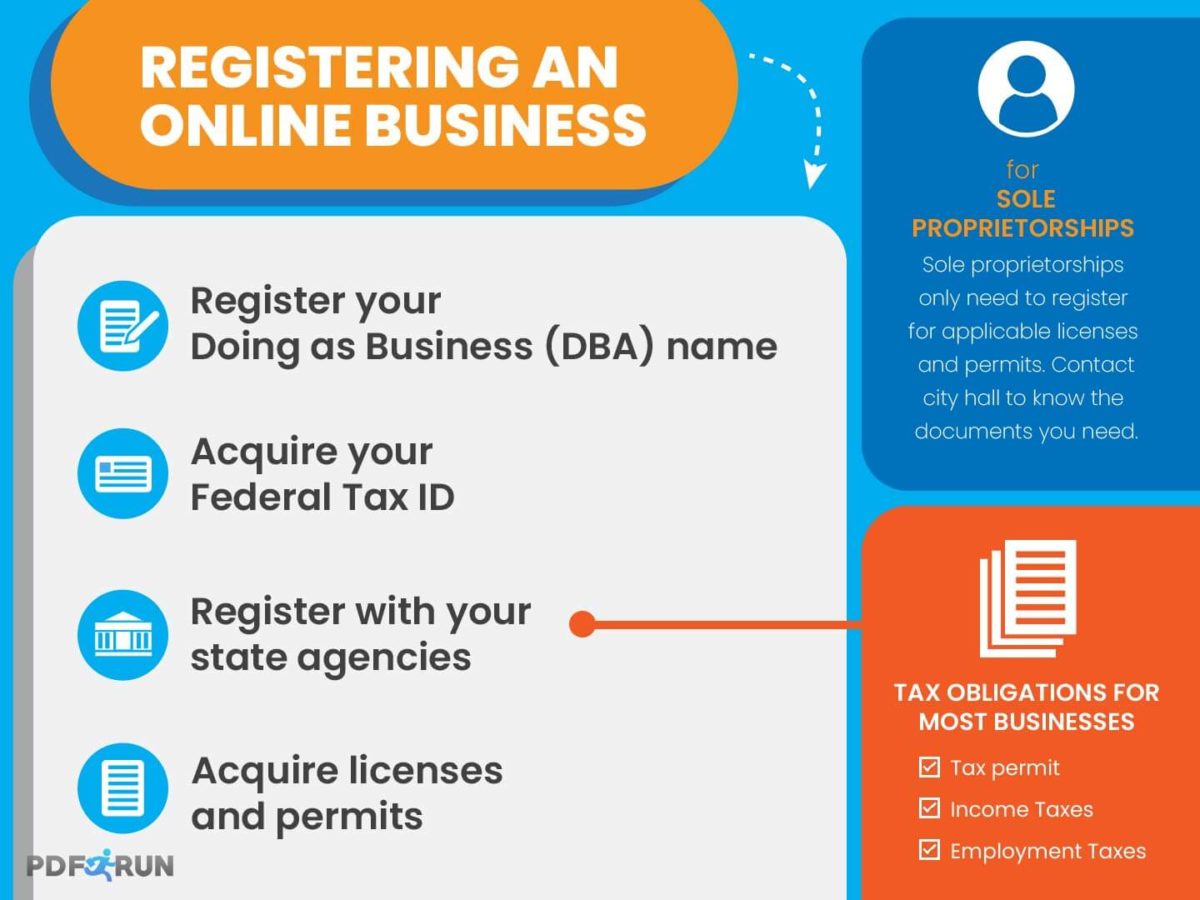
- For sole proprietorships:
Sole proprietorships only need to register for applicable licenses and permits. The licenses and permits required to operate legally will depend on your location and industry. Contact your city hall to know the documents you need to register your online business. The licenses and permits you would apply for at your local government may include Business Operation License, Sales Tax License, Home Occupation Permit, and Sales Tax License and require a small fee.
- Register your Doing Business As (DBA) name
Before registering your online business with the IRS, you would want to choose a Doing Business As (DBA) name that reflects your brand identity. You may register it with the local government where your business is located.
While registering a DBA name grants no legal security, having a formal business name allows you to conduct business under a name that is not your legal name. Furthermore, a DBA and Employee Identification Number (EIN) or your federal tax ID number, enable you to open a business bank account for your online business.
- Acquire your federal tax ID
The IRS will use your EIN or federal tax ID to distinguish your business. If your online business is in the U.S. or U.S. territory, has employees, withholds taxes on the wages of employees, and operates as a partnership or corporation, you need to apply for an EIN.
You may apply for an EIN online by completing Form SS-4 and submitting it to the IRS.
- Register with your state agencies
Each state has its tax laws and laws on conducting business activities.
If your online business sells products and needs to collect sales taxes, you have to obtain a Sales Tax Permit or Vendor’s License from your state or local government or both. You may contact them to get the full list of documents you need to submit, as the requirements vary per state.
The following tax obligations for the majority of businesses are:
-
- Tax Permit — Most states require businesses to register with a state tax agency and obtain relevant tax permits. Tax permits enable entrepreneurs to collect sales tax from customers.
- Income Taxes — Almost all states impose business or corporate income tax. It is a direct tax imposed on the income of some legal business entities. Nevertheless, tax obligations are dependent on the structure of a business.
- Employment Taxes — All states impose employment taxes on businesses that have employees. Employer taxes will depend on the income of employees.
In terms of conducting business activities in a state, you need to register with the Secretary of State’s office, a Business Bureau, or a Business Agency, if your business meets the following conditions:
-
- Your business has a physical presence in the state
- You conduct in-person meetings with clients in the state
- Your company’s significant portion of revenue comes from the state
- Your employees work in the state
The requirements to register with the mentioned offices vary per state. You may contact them to get an accurate list.
- Acquire licenses and permits
The types of licenses and permits vary depending on the category, activities, and location of your business. Visit your local or state government to find out the permits and licenses you need to obtain for your online business to operate legally.
The fees of business licenses and permits also vary. Moreover, they expire after some time; therefore, you have to keep track of ideal renewal dates to continue operating lawfully.
Step 8: Market your online business
Disregarding marketing your online business defeats the purpose of doing an online business. The COVID-19 pandemic has forced people to go digital to avoid physical contact; therefore, it is safe to assume that the majority of people across the world are now online.

- Social Media
Leverage the popularity of social media by becoming a savvy digital marketer. Create business accounts on Facebook, Twitter, and Instagram. Use them to promote your business and to gain a strong online presence. Aside from regularly posting content about your products or services, you can also publish relevant content that would engage your target market and highlight your brand identity. You may invest in social network advertising to expand your reach and get more customers.
- Search Engines
Aside from social network advertising, you can use search engine marketing and optimization to increase your chances of being the company that potential customers choose to deal with after searching online.
- Website
Creating a website is a great method to catch the attention of potential customers and entice them to avail of your products and services. Aside from dedicated pages for your products and services, you can regularly publish high-quality and informative blogs that establish your credibility and add value to your potential clients. Having a website is an effective way to get the email addresses of customers for email marketing. Primarily, make sure your website is intuitive, has an eye-catching interface and design, and easy to use.
Is it an appropriate time to open an online business?
Due to the convenience and added protection from COVID-19 that online transactions bring, the reliance of consumers on online businesses continues to strengthen.
The future of e-business is hopeful. Despite the disruptions the pandemic has caused, countless online businesses are opening. However, while there is no perfect time to start a business, aspiring online entrepreneurs have qualms about opening a business during a global crisis due to financial risks. They acknowledge that not all businesses will succeed in the current global financial setting. Furthermore, the threat of failing seems to be more tangible, as sustaining a business during a tough economic crisis is a difficult undertaking.
Starting a company during a financial crisis or recession may seem nerve-racking, but for agile and innovative entrepreneurs, now may be an opportune time to launch a business. Some of the most prominent global brands started during economic crises caused by recessions.
Some of the companies born during a financial crisis and that are still successful today include Microsoft, the global technology giant that billionaire Bill Gates started in 1975, only a few days after the 16-month recession that started in 1973; Trader Joe’s, an American chain of grocery stores that Joe Coulumbre founded in 1958 during the Recession of 1958; and Hewlett-Packard (HP), one of the global powerhouses in computers founded by William Hewlett and David Packard in 1939 during the Great Depression.
Long-term advantages
For people who subscribe to conventional business mindsets, it seems wise to open a business when the economy is healthy and financial risks are minor. On the contrary, starting a business during the COVID-19 pandemic may seem imprudent. Despite the potential consequences, now remains a good time to start an online business; there are long-term benefits that opening an online business during a pandemic could bring.
- A growing market
As consumers discover the convenience of online transactions while stuck at home, online businesses become in demand. As a result, online businesses must create and establish a reliable and stable online marketplace where consumers can transact without difficulties.
Due to lockdown measures that governments across the world enforce, businesses that engage and serve clients both online and offline can outpace those that solely rely on in-store sales.
- A wide-reaching opportunity
Previously, locally owned businesses can only cater to local consumers and those who live in nearby cities. Today, having an online business empowers entrepreneurs to connect with potential customers from different locations. Their products can gain exposure and popularity even on a global scale, increasing sales opportunities at a noteworthy rate.
Moreover, products sold online can secure a loyal fanbase — people who will be repeat customers and active promoters.
- A crisis produces perseverance
Despite the turmoil that COVID-19 has been causing, our drive to rise above difficulties remains intact. Opening a business during a pandemic may seem incautious, but even starting a business when the economy is healthy does not guarantee success.
Difficulties test and strengthen perseverance. Your problem-solving skills will develop. Your determination will fortify. If you can sustain an online business during a global financial crisis, you might be able to surmount any future crises your business would encounter.
Are you ready to open an online business?
Starting an online business entails hard work; maintaining it requires wisdom. Thus, it is wise to design a thorough business plan before starting an online business for you to be well-equipped with the right mindset and strategies when you face any setbacks.
